
Greenwashing, also called "green sheen", is a form of marketing spin in which green PR and green marketing are deceptively used to persuade the public that an organization's products, aims and policies are environmentally friendly and therefore ‘better’; appeal to nature. Common examples present in the marketing of food products, alternative medicine and natural medicine.

Organic certification is a certification process for producers of organic food and other organic agricultural products. In general, any business directly involved in food production can be certified, including seed suppliers, farmers, food processors, retailers and restaurants. A lesser known counterpart is certification for organic textiles that includes certification of textile products made from organically grown fibres.

Environment friendly processes, or environmental-friendly processes, are sustainability and marketing terms referring to goods and services, laws, guidelines and policies that claim reduced, minimal, or no harm upon ecosystems or the environment. Companies use these ambiguous terms to promote goods and services, sometimes with additional, more specific certifications, such as ecolabels. Their overuse can be referred to as greenwashing.

The Marine Stewardship Council (MSC) is an independent non-profit organization which sets a standard for sustainable fishing. Fisheries that wish to demonstrate they are well-managed and sustainable compared to the science-based MSC standard are assessed by a team of experts who are independent of both the fishery and the MSC. Seafood products can display the blue MSC ecolabel only if that seafood can be traced back through the supply chain to a fishery that has been certified against the MSC standard.
Quality Assurance International (QAI) is a U.S.-based international organic certification company that is authorized by the United States Department of Agriculture (USDA) as "a USDA-accredited certifying agent that operates globally to certify organic operations to National Organic Program standards." It is a for-profit corporation, established in 1989, and headquartered in San Diego, California. It is one of the world's largest certifiers, operating in the United States, Canada, Latin America, European Union, and Japan. It is owned by public health and environmental organization NSF International.
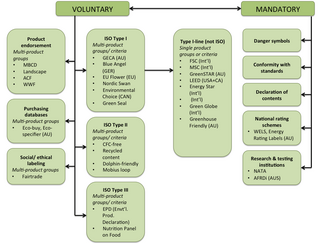
Eco-labels and Green Stickers are labeling systems for food and consumer products. Ecolabels are voluntary, but green stickers are mandated by law; for example, in North America major appliances and automobiles use Energy Star. They are a form of sustainability measurement directed at consumers, intended to make it easy to take environmental concerns into account when shopping. Some labels quantify pollution or energy consumption by way of index scores or units of measurement, while others assert compliance with a set of practices or minimum requirements for sustainability or reduction of harm to the environment. Many ecolabels are focused on minimising the negative ecological impacts of primary production or resource extraction in a given sector or commodity through a set of good practices that are captured in a sustainability standard. Through a verification process, usually referred to as "certification", a farm, forest, fishery, or mine can show that it complies with a standard and earn the right to sell its products as certified through the supply chain, often resulting in a consumer-facing ecolabel.

The Blue Angel is a German certification for products and services that have environmentally friendly aspects.
The Global Ecolabelling Network (GEN) is a non-profit network composed of some 27 ecolabel organisations throughout the world representing nearly 60 countries and territories, with 2 associate members and a growing number of affiliate members, one of which is Google. GEN members have certified over 252,000 products and services for environmental leadership. GEN was established in 1994.

The Rainforest Alliance is an international non-governmental organization (NGO) based in New York City and Amsterdam, with operations in more than 60 countries. It was founded in 1987 by Daniel Katz, who serves as the Chair of the board of directors. Its main work is the provision of an environmental certification on sustainable forestry and agriculture and tourism. Its certificate seal gives information to consumers about business practices, based on certain standards they set.
Green marketing is the marketing of products that are presumed to be environmentally safe. It incorporates a broad range of activities, including product modification, changes to the production process, sustainable packaging, as well as modifying advertising. Yet defining green marketing is not a simple task where several meanings intersect and contradict each other; an example of this will be the existence of varying social, environmental and retail definitions attached to this term. Other similar terms used are environmental marketing and ecological marketing.
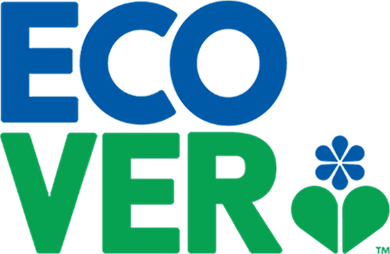
Ecover is a Belgian company that manufactures ecologically sound cleaning products and is owned by S. C. Johnson & Son.

UTZ, formerly called UTZ Certified, is a program and a label for sustainable farming. The UTZ label is featured on more than 10,000 product packages in over 116 countries. From 2014, UTZ is the largest program for sustainable farming of coffee and cocoa in the world. The UTZ program covers good agricultural practices, social and living conditions, farm management, and the environment.
The Sustainable Forestry Initiative (SFI) is a North American 'forest certification standard' and program of SFI Inc., a non-profit organization. The Sustainable Forestry Initiative is the world's largest single forest certification standard by area. The SFI is headquartered in Ottawa, Ontario Canada and Washington D.C. USA.
Sustainable seafood is seafood that is either caught or farmed in ways that consider the long-term vitality of harvested species and the well-being of the oceans, as well as the livelihoods of fisheries-dependent communities. It was first promoted through the sustainable seafood movement which began in the 1990s. This operation highlights overfishing and environmentally destructive fishing methods. Through a number of initiatives, the movement has increased awareness and raised concerns over the way our seafood is obtained.
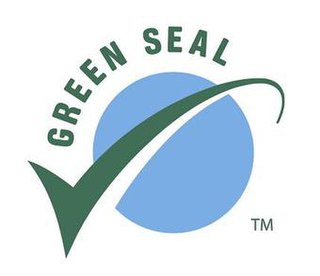
Green Seal is a non-profit environmental standard development and certification organization. Its flagship program is the certification of products, services, restaurants, and hotels. Certification is based on Green Seal standards, which contain performance, health, and sustainability criteria.

Bullfrog Power, a Spark Power company, is a Canadian green energy retailer operating in Canada. Bullfrog offers green electricity from renewable energy sources such as wind and low-impact hydro, as well as green fuel and green natural gas, a renewable biogas product that serves as an alternative to fossil fuel-based natural gas. Bullfrog only sources electricity from generation sources that meet or exceed the federal government's Environmental Choice Program EcoLogo standard for renewable electricity. Bullfrog's green natural gas product is produced at facilities that have met environmental standards as defined by ICF International.
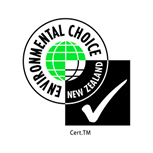
Environmental Choice New Zealand (ECNZ) is the official ecolabel of New Zealand. The label is owned and endorsed by the Ministry for the Environment of the New Zealand Government. The Environmental Choice programme, which started in 1992, is administered by the New Zealand Ecolabelling Trust on behalf of, but independently from, the Ministry for the Environment. The trust and the programme are part of the Global Ecolabelling Network.
Sustainable products are those products that provide environmental, social and economic benefits while protecting public health and environment over their whole life cycle, from the extraction of raw materials until the final disposal.
Environmental certification is a form of environmental regulation and development where a company can voluntarily choose to comply with predefined processes or objectives set forth by the certification service. Most certification services have a logo which can be applied to products certified under their standards. This is seen as a form of corporate social responsibility allowing companies to address their obligation to minimise the harmful impacts to the environment by voluntarily following a set of externally set and measured objectives.
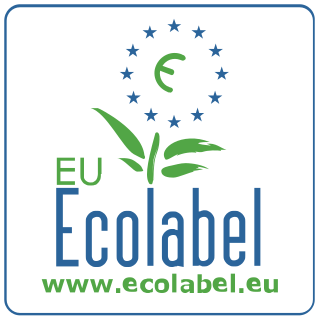
EU Ecolabel or EU Flower is a voluntary ecolabel scheme established in 1992 by the European Commission.












